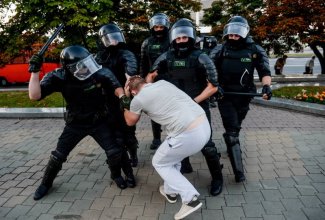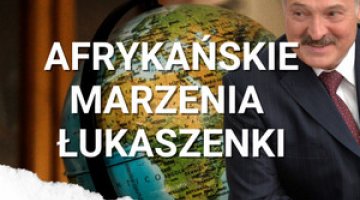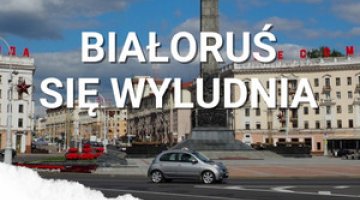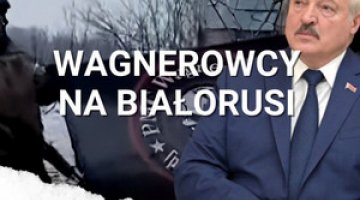Second night of post-election protests in Belarus

During the evening and overnight, more protests numbering at least several thousand people took place in Minsk, dispersed throughout various parts of the city. In some parts of the capital there were serious clashes with law enforcement forces, including the special Alfa units of the KGB. The law enforcement officers again used coercive measures, flashbang grenades, rubber bullets, water cannons and tear gas. In response the demonstrators threw cobblestones and, occasionally, Molotov cocktails. The security forces’ actions were very brutal. Many protesters have been detained, and there have been injuries and at least one fatality.
Once again, demonstrations took place in regions, including smaller towns (including Zhabinka, Darahichyn and Ashmyany), whose inhabitants had not hitherto shown any desire to protest. A significant number of independent websites are still down, and in cities the internet has been blocked. Earlier, during the day, there was a report that an attempt to call a strike had been made metallurgical plant in Zhlobin, although production was not stopped for any serious length of time. At the same time, there were calls online to start a general strike as of 11 August.
According to the data provided in the afternoon of 10 August by the Central Election Commission (CEC), Alyaksandr Lukashenka won the elections: he received 80% of the vote, while his main competitor Sviatlana Tsikhanouskaya got 10%. Independent organisations monitoring the voting confirmed that voter fraud had taken place on an enormous scale. In the morning, even before the final results were announced, Lukashenka received congratulations from President Putin, who expressed his hope for the development of cooperation with Belarus, including within the Union State.
Tsikhanouskaya, on the other hand, stated that she did not recognise the official election results and considers herself the winner of the vote; this has been justified by data from a number (more than 50) of the election committees, as well as the results from the alternative vote count as part of the ‘Glos’ campaign. The candidate submitted a formal complaint to the CEC, demanding a recount of the votes in some of the electoral precincts, and then left for Lithuania, where she had previously taken her children.
Commenting on the voting process, the Belarusian president expressed his regret that the holiday atmosphere in Belarus had been “spoiled” by “provocateurs” deliberately slowing down the work of the electoral committees, which in his opinion was intended to increase tension among voters waiting hours to cast their ballots. Referring to the demonstrations that took place across the country after the vote, the president said that he would not allow “circles controlled from outside” to destabilise the country, including the centres of the Belarusian diaspora in Poland, the Czech Republic, Russia and Ukraine. According to data from the Ministry of the Interior, about 3000 people were arrested across the country after Sunday’s demonstrations (of whom around 1000 were participants in protests in the capital).
Commentary
- The demonstrations, which are taking place for the second day in a row, are still spontaneous in nature, despite the participants’ great determination, their confrontations with the security forces and the construction of makeshift barricades. No strategy has emerged from the course of the protests so far, and there is a lack of leaders or a long-term plan. Even before leaving the country, Tsikhanouskaya clearly distanced herself from the demonstrations; she probably avoided arrest thanks to this decision, but by doing so she has also weakened the symbolic dimension of the protests, in defence of her election result for example. At the same time, by intensifying their actions both against the protesters and many passers-by, the authorities are provoking a further escalation of social anger.
- The protests have covered the whole country, including small towns. Now as before, law enforcement has been concentrated in large cities, which means that demonstrations in smaller towns are more peaceful and the militia there have reacted with less brutality. Although it seems that the overall number of demonstrators was smaller, something which could have been influenced by mass detentions and the security forces’ decisive actions, the most radically inclined groups have also emerged (numbering several hundred people in each of the large cities).
- Lukashenka’s comments, as well as the statements by the institutions of force, are intended to fully discredit the protesters by accusing them of being unaware of external manipulations by hooligans. The president, referring to his alleged 80% mandate of support in his speeches, has not given up on the idea of falsifying reality, even considering the marked escalation of public dissatisfaction. At the same time, he is showing his full determination to defend the political system he has created, with no option of holding dialogue with his opponents. This also explains the exceptional – even by Belarusian standards – violence used by law enforcement officers. In the near term, we should expect extensive repression involving special units to continue, with the intention of completely crushing the protests. This will be accompanied by ever more extreme propaganda, which will exclusively blame the protests on provocations by unknown forces both inside and outside the country, and portray the participants in the protests as being of low moral character.
- Russia has officially expressed its support for the Belarusian regime. The elections were deemed fair by the Russian-dominated CIS observation mission (headed by the former head of the Foreign Intelligence Service, Sergei Lebedev). For Moscow, Lukashenka guarantees the continuation of the desired authoritarian model of power in Belarus and its structural dependence on Russia, despite the disputes and differences of interests between the two sides. At the same time, the suggestion contained in Putin’s congratulatory message about the need to deepen the integration of both countries within the Union State probably represents an announcement of the resumption this autumn of negotiations concerning the unification of the legal systems of Belarus and Russia, talks which could prove dangerous for Minsk. This was confirmed by the statement from the Russian ambassador to Belarus, Dmitri Mezentsev, who explicitly called for the resumption of the work (suspended at the end of last year) on reconciling the 31 so-called ‘road maps’ regulating individual areas of the closer integration between both countries.




